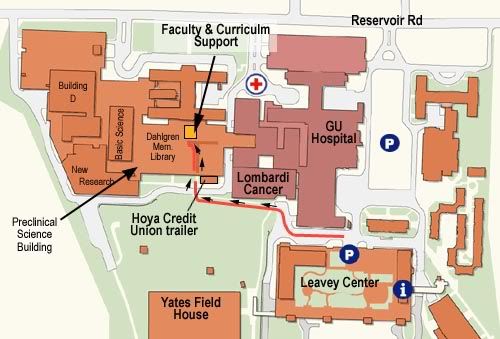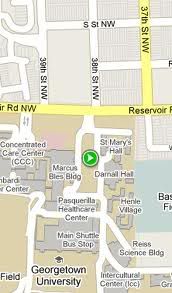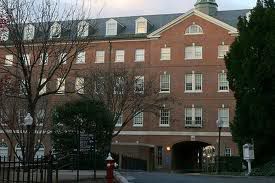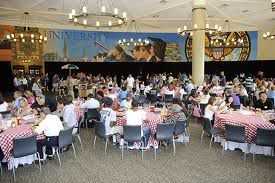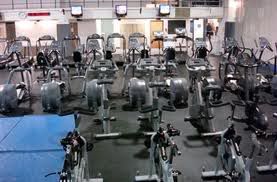Anthony Robbins once said that “In life you need either inspiration or desperation.” He wasn't kidding. With the renewal of yearly acceptance letters arriving in various homes (I imagine, via owl) I feel it is necessary that I begin posting up new information to Georgetown's newest. Congratulations! If you haven't read this blog before, you should jump back to the beginning and start reading there, and follow me or subscribe via RSS--I will be posting all kinds of helpful hints that will help to make your transition to Georgetown a little bit easier.
That being said, today's topic is the most concrete example of inspiration born of desperation: surviving Leos.
/* If you just want to jump straight to the meal ideas, head down until you
* see the next comment section. If you want to read my humorous rant about
* Leos, read on.
*/
When you arrive here, you will be lulled into a false sense of security regarding Leos. It is expansive--with two floors, and it's own stir-fry bar, you will be impressed. In comparison to anything you have heretofor experienced, it will seem incredible. Cakes of all varieties; icecream in freshly made waffle cones, with every sauce imaginable; cookies by the hundreds for your taking after every single meal.
You will listen to the upper classmen complain, and you will think to yourself. "Surely, with all of this variety, I will be happy for the next two years of required on-campus meals."
This is a lie.
Georgetown's cafeteria has variety--but it is the same variety. The "different every day meals" are variations on the same 20 things, half of which are only eaten by the very brave and the very vegetarian ("Israeli couscous in a plumb eggplant curry"...okay, that's only half in jest); whereas the various things that are available every day become quickly old. The first semester at Leos is fine. You eat the hundreds of cookies, you gain the freshmen fifteen, you stop eating the cookies, you start eating the cake, you gain the freshman twenty, you panic and start living at Yates and eating the scary vegan dishes, and everything turns out ok. But beginning with second semester, things start to get bad. You've had pasta and/or stir-fry for at least one meal every three days; you cannot stomach another cardboard pizza; the lines for everything get longer and you choose more often to eat the "guess what I am vegan saute of the day" option. At some point, the obligation to eat the 13$ worth of food they charge you for makes Leos some kind of a strange Vegan-based chore (did I mention that Georgetown is in the top ten for best Vegan cafeterias in America? The are making sure they hold on to that by increasing the oddness of the vegan dishes available), and you begin to get desperate.
This is when you start to get creative. By the time you reach your sophomore year at Georgetown, you develop a number of academic, social, and gastronomic tricks. You learn that, to buy yourself time on an essay, you can take a picture, save it as a .docx file, and email it to your professor (it will look like a corrupted file, and you'll get the extra day or so before the professor checks your attachment to fix the essay)*; you've learned that Georgetown has an unspoken rule that Freshman don't buy alcohol, and that the upper classmen buy it on a "pass it on" basis for future years (this is off of campus knowledge, not personal--I'm a teetotaler--and I really don't recommend under 21's drink, as if the metro cops catch you your ass is grass); and you learn to survive at Leos.
Learning Leos is kind of like playing that game Alchemy on your android phone. You start with four basic elements, and then you have to form hundreds of things from those four things. Leos is just like that.
I want to save you from this experience. I hope, that by passing on my experience, I can save you all from that second semester of ill-fated exploration with what can, cannot, and should not, be combined at Leos.
/////////////////////////////////////////////////////////////////////////////////
//THINGS YOU CAN COMBINE AT LEOS AND THEIR LOCATIONS
/////////////////////////////////////////////////////////////////////////////////
//DOWNSTAIRS
1) BLT
In the morning/brunch (all day...) weekends: Bacon (breakfast bar) + lettuce, mayo, tomato (sandwich section) + toast (sandwich section + dry reheater)
2) Fried Egg Sandwhich / Egg McMuffin
Egg from Egg station (ask for a fried egg instead of an omelet at the receiving end of the hamburger/etc. station, they'll do it) + toast (sandwich section + reheater) or English muffing/roll + mayo
3) Better Personal Pizza
Abuse the salad station to increase your toppings; also consider using the English muffins. They will accept those as valid personal pizza crusts. Also consider using pita bread and feta cheese from the salad bar (thanks, Beth!)
4) Better Ice Cream
* If you ask for a fresh waffle cone, they will make it
* If you heat a cookie in the microwaves, you can then drown it in fudge and coat with ice cream. the same can be done with apple and cherry pie. However, I did warn you about the whole freshman fifteen thing, right?
* you can plug up the bottom of a waffle cone with either fresh fudge + a quick application of ice cream or a marshmallow. The marshmallow will plug it up, as will frozen fudge if you can do it quick enough.
* soda machine + ice cream = root beer float.
* cookie + soft serve + cookie = cookie icecream sandwich
* I've also heard people discuss "desert pizzas", but I have no idea what is meant by this...you might have to experiment.
5) Better sandwich
Use the salad station to your advantage. Toast your bread; use the panini grill. Keep an eye out at the meat section upstairs for fresh roast beef with gravy--quick and easy open-faced roast beef sandwich. Also, consider the fresh bread upstairs instead of the bag bread. Garlic bread sandwich? Why not!
* Also, "Leos Chicken Madness":
- 1 sub roll from sandwich station
- tomatoes, lettuce, onion, cheese from sandwich station, to taste
- 1-2 pieces grilled chicken from bistro
- if you like peppers, im almost positive the diner has them... they also always have bacon if you ask
toast sub roll, cut up chicken, mix with "veggies," place in sub roll, cover with cheese, fold over, place in microwave for 30s. (Thanks Dan!)
6) Fruit and Granola parfait
Yogurt from salad section + granola from cereal section + fruit from the salad section (fresh bananas, apples, and oranges upstairs in the barrels and peaches usually near the salad downstairs).
7) Unlock unknown options
The burger bar makes things that aren't on the list. I consider it a kind of guessing game. Submit options, and see if they make them. For example, they make grilled cheese. I'm almost sure they could make bacon grilled cheese...experiment.
//UPSTAIRS
8) Non-vegan pasta
So, as part of the vegan takeover, the pasta fryers don't offer any meat, and the line is long. Better option: Grab the same pasta and sauce from the veggie bar, then grab the veggies you want from the pasta bar. Split with all of it over to the stir-fry bar. They will add stir-fry beef, chicken, or shrimp along with any stir-fry items you want, and fry up you pasta from the other section. Plus, they are faster, and your food wont be drowning in oil.
9) Similarly, more-options Stir-fry
Just grab salad bar or pasta bar veggies before you head over to stir-fry. The daily mystery meat option and the wrap bar may also give you new non-vegetarian-friendly alternatives. Bonus: whole baked chicken breast are available at the taco bar. They wont tell you that, but they are, just ask.
10) Free study snacks
If you chill out with your homework in Leos from 2-5, it will be relatively quiet. This is because they stop putting out lunch food and they haven't started putting out dinner food by this time. This means you can snag a table somewhere quiet to work, and you can grab candy from the ice cream toppings bar, or veggies from the salad bar, or dried cereal or whatever to munch on. You'll have a big, quiet table with drinks and snacks for several hours. If you are so inclined, you can put off lunch until two, then stay until dinner starts coming out at 4:30. This will save you a meal, which you can use to get breakfast on the weekends or for a spare grab and go.
I will continue to update this list as other upperclassmen write me in submissions, but for now, good luck with Leos! Please remember that anyone can email me with ANY QUESTIONS about student life at GU, and I will answer them either privately or on this blog. Once again, I am NOT a representative of Georgetown, I do this in my spare time, I don't give legal advice, don't do anything post here if it seems immoral or illegal (I'm probably just making a joke, anyway) and I'm only here to help. :) Have a good one,
April
p.s - Off campus dining guide will be in a future blog post.
*I'll post an academic tricks tutorial too, no worries.
*I also don't really recommend this. I'm sure if you get caught the university would have a hernia, and I think it would turn out badly. I have heard of it being done, however, and there's nothing wrong with passing along the possibility for your, erm, academic discussion of its practicality, if not moral uprightness.
